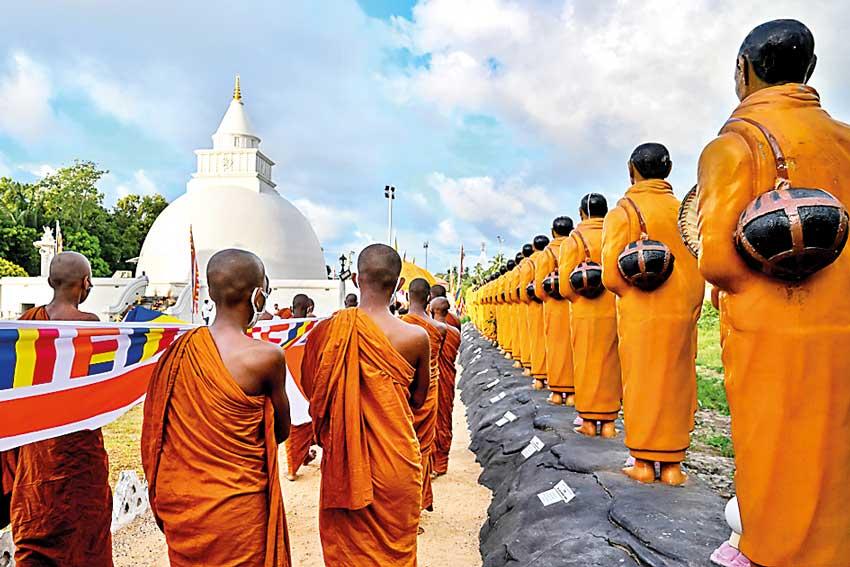Reply To:
Name - Reply Comment

We ourselves are responsible for our own happiness and misery. We are the architects of our own fate.
The law of Karma is comparable to Newton’s third law of motion, which states that for every action there is an equal and opposite reaction
 The word karma literally means action and its result is called vipaka though generally the word kamma is used to cover both actions and results. Nevertheless, all actions are not considered karma. The word simply denotes all volitional, intentional and wilful acts, and not involuntary or mechanical actions. These volitional acts may be wholesome (kusala), that is morally good or morally bad (akusala), or morally (neutral). Neutral karma has no moral consequence either because very nature of action or because it is done unintentionally or involuntarily. Actions can be physical, verbal or mental. In other words, the word karma denotes all volitional activities, which find expression in thought, speech and physical deeds, which may be wholesome or unwholesome.
The word karma literally means action and its result is called vipaka though generally the word kamma is used to cover both actions and results. Nevertheless, all actions are not considered karma. The word simply denotes all volitional, intentional and wilful acts, and not involuntary or mechanical actions. These volitional acts may be wholesome (kusala), that is morally good or morally bad (akusala), or morally (neutral). Neutral karma has no moral consequence either because very nature of action or because it is done unintentionally or involuntarily. Actions can be physical, verbal or mental. In other words, the word karma denotes all volitional activities, which find expression in thought, speech and physical deeds, which may be wholesome or unwholesome.
The first two verses of the Dhammapada succinctly state thus: “Mind foreruns all conditions, they are mind made. If one speaks or acts with a wicked mind, because of that suffering follows one, even as the wheel follows the hoof of the draught ox. If one speaks or acts with a good mind, because of that happiness follows one”. (Ven. Narada). Therefore, it is evident that in the working of karma it is the mind which plays the dominant role.
Although Buddhism ascribes these differences and inequalities existing amongst mankind to the working of karma, it does not however, assert it is the only reason for such differences
The Karma is the law of nature, which applies to all beings irrespective of whether they are Buddhists or not. The mental qualities which motivate a person to resort to a particular action will determine the moral quality of the action. In other words, Karma simply means that what we do, we become. All our actions are bound to produce corresponding consequences. Even If we do not immediately experience the consequences they will inevitably rebound back to us as soon as time and conditions are conducive. It is important to remember, whatever we have earned in life is what we earned. We ourselves are responsible for our own happiness and misery. We are the architects of our own fate.
At the time of death the supreme authority of Karma overrides everything all that is left is our karma.
The law of Karma is comparable to Newton’s third law of motion, which states that for every action there is an equal and opposite reaction. In essence, both the law of karma in Buddhism and the Newton’s third law of motion used to describe the law of physics in the material universe express the same underlying principle.
Kamma is an immutable law of cause and effect also called law of action and reaction always operates in the realm of human conduct and human affairs and we cannot avoid its inevitable consequences. In the finite time of our births, through all the realms of existence, we have done so many different kinds of action wholesome and unwholesome.
It is said that consequences our karma are programmed into us from our birth and no power can stop from yielding its vipaka (result). Most of our pleasant and unpleasant experiences in the present life represent the ripening of karma committed either in the present or past life.In other words, what we reap today is what we have sown either in the present or in the past.
In the world around us we see many inequalities in the lot of mankind. We see one person being brought up in the lap luxury, endowed with mental, moral and physical qualities, while in another in absolute poverty and in abject misery. Again one being born a Millionaire another a pauper. Then again, one is born as a mental prodigy another an idiot. Some are congenitally born blind, deaf and deformed. While one person is blessed with longevity, another perish in the prime of their youth. How do we account for these differences in this ill balanced world. (Ven. Narada).
Although Buddhism ascribes these differences and inequalities existing amongst mankind to the working of karma, it does not however, assert it is the only reason for such differences.
According to Buddhism, there are five orders or processes (niyamas) which operate in the physical and mental realms:
i) Kamma niyama, order of act and result, e.g. desirable and undesirable acts produce corresponding good and bad results.
ii) Utu niyama, physical (inorganic) order, e.g. seasonal phenomena of winds and rains.
iii) Bija niyama, order of germs or seeds (physical organic order); e.g. rice produced from rice-seed.
iv) Citta Niyama, order of mind or psychic law, e.g. processes of consciousness (citta vithi), power of mind, etc.
V) Dhamma niyama, order of the morn, e.g. the natural phenomena occurring at the advent of a bodhisatta in his last birth, gravitation. etc. (Ven. Narada).
However, it should be stated that most of the major circumstances and events of our life are conditioned by karma.
The Buddhist teaching of karma is not strictly deterministic or predestined as all present conditions cannot be attributed to karma. There is no linear relationship between a particular act and its result.
Effects of karma can manifest themselves either in this very life or in the next life or only after several lives, depending on the enormity of the karma committed. When effects of karma manifest themselves we can see the fruit karma within a relatively short period of time.
Reflecting on the law of karma from time to time dissuades us from committing unwholesome actions which have suffering as there result.